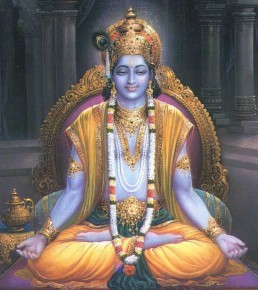Commentary
In this concluding verse of the Song Divine Sanjaya summarizes the assessment of his total experience of hearing the conversation between Sri Krishna and Arjuna.
Sri Krishna, The Lord of Yoga – All through the Gita Sri Krishna represented the Self, the Atman, the substratum upon which everything happens. He can be invoked within us by means of any one of the techniques of Yoga taught in the Gita.
Arjuna, ready with the bow – Partha represents in the Gita a confused, limited, ordinary mortal with all his weaknesses, agitations, fears and pairs of opposites. When he has thrown out his instruments of action i.e. bow and arrows, there can be no hope of success or prosperity for him. But when he is ready with his bow he is prepared and willing to use his faculties to face the challenges of life.
Taken these two together – Sri Krishna, the Yogeswara and Arjuna, the Dhanurdhara – they symbolize a way of life wherein man, with the spiritual understanding, gets ready to face the battle of life . For him success is assured.
The teaching of the Gita is Yoga and the teacher is Yogeswara. When the human soul becomes enlightened and united with the divine, fortune and victory, welfare and morality are assured.
Today’s confusions and conflicts in society and man’s helplessness against the flood of events, in spite of his achievements in science and mastery over matter, is due to his failure to invoke the Yogeswara in him. A happy blending of the sacred and the secular is what is advised in the Gita as a policy for right living.
Sage Veda Vyasa visualizes a world order in which man pursues a way of life in which the spiritual and material values are well balanced. Material prosperity without inner
peace is savagery while spirituality without material well being is madness. Spiritual vision and social service should go together.
The double purpose of human life, personal perfection and social efficiency is indicated here. Human perfection is a kind of marriage between high thought and just action where the priesthood and the kingship move together. This, according to the Gita, must be, for ever, the aim of man.
This last Chapter of the Gita is called `The Yoga of Liberation by Renunciation’ because to renounce false values in us is at once to rediscover the Divine nature in each one of us which is the essential heritage of man. To discard the animal in us (Sannyasa) is the Liberation (Moksha) of the Divine in us.
Swami Chinmayananda
Swami Chinmayananda Commentary
The commentary on this verse and the rest, is avaialble for free as:
Kindle eBook
Google Play Book
Apple Books
Adi Sankara Commentary
To be brief, yatra, where, the side on which; there is Krishna, yogeswarah, the Lord of yogas-who is the Lord of all the yogas and the source of all the yogas, since they originate from Him; and yatra, where, the side on which; there is Partha, dhanurdharah, the wielder of the bow, of the bow called Gandiva; tatra, there, on that side of the Pandavas; are srih, fortune; vijayah, victory; and there itself is bhutih, prosperity, great abundance of fortune; and dhruva, unfailing; nitih, prudence. Such is me, my ; matih, conviction.
The Bhagavad Gita with the commentary of Sri Sankaracharya – Translated by Alladi Mahadeva Sastry
Holy Geeta – Commentary by Swami Chinmayananda
The Bhagavad Gita by Eknath Easwaran – Best selling translation of the Bhagavad Gita
The Bhagavad Gita – Translation and Commentary by Swami Sivananda
Bhagavad Gita – Translation and Commentary by Bhaktivedanta Swami Prabupadha
Srimad Bhagavad Gita Chapter 18 – Verse 78 – 18.78 yatra yogesvarah krsno – All Bhagavad Gita (Geeta) Verses in Sanskrit, English, Transliteration, Word Meaning, Translation, Audio, Shankara Bhashya, Adi Sankaracharya Commentary and Links to Videos by Swami Chinmayananda and others – 18-78

